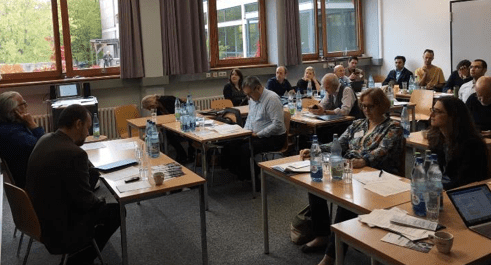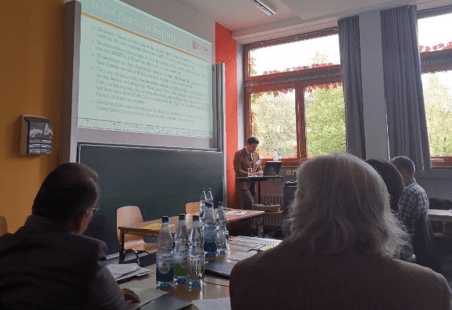The second Conference on the apocalyptic figures, Gog and Magog, was held, from September 23 to 25, at the FAU Erlangen-Nürnberg. Preceded by a successful academic event about the eschatological idea on February 2018, the even larger conference, organized by Prof. Georges Tamer (Chair of Oriental Philology and Islamic Studies FAU Erlangen-Nürnberg), Dr. Julia Eva Wannenmacher (University Bern) and Dr. Lutz Greisiger (ZfL, Berlin), examined this subject in much more detail, as many participants from various academic disciplines contributed to the success of the conference with their presentations and papers.

Gog and Magog consuming humans. Thomas de Kent’s Roman de toute chevalerie, Paris manuscript, 14th century. Wikimedia Commons
The Conference, entitled “POLITICS · HISTORY · ESCHATOLOGY. Functional, Inter(con)textual, Structural and Comparative Approaches to Gog and Magog”, aimed to analyze the possible interpretations, ambiguousness and historical dynamics of this eschatological motive, especially in order to observe the potential creation of enemy stereotypes in most cases associated with the concept of “Othering”. The conference necessitated a historical reconstruction of the figures of Gog and Magog, by analytically studying numerous historical sources, as ancient and mediaeval texts and even illustrations, together with philological examinations, including philosophical and theological insights to this subject, which all together was diligently presented and discussed by the participants. Hence, the conference provided a platform of sharing ideas and perceptions with the result that there is still more to be discovered about this eschatological figures.
Also, the artistic presentation by the artist group “Internil” was a special highlight of the conference. Marina Miller Dessau and Arne Vogelgesang played: The Theatrical Production “Gog/Magog–An Apocalyptic Disinformation Campaign.” This representation, which included excerpts of theatrical performances, music and biographical narrations, clearly emphasized the valuable interaction between scholarship and art.

The concluding session at the end of the conference remarked the importance of further researches in the field of Eschatology, particularly in relation to Gog and Magog, since there are many traditional Islamic sources regarding Gog and Magog, who still have to be examined. Thus, many participants therefore called for a third conference. However, before a further conference can be organized, the academic achievement of both conferences has to be published in a collected volume, who will include all contributions of the participants. The editing-process of the volume is currently ongoing.

The conferences and as well as the publication about the eschatological motive of Gog and Magog intend to encourage other scholars and academics to approach the subject of Eschatology, as the concept of End of the World is constantly recurring in the historical narrative of mankind.
The following presentations comprehensively touch upon various religious, historical, social and linguistic issues revolving around “Gog and Magog” in different languages.
Presentation List
Agustí Alemany Vilamajó (UAB Barcelona)
The Gog and Magog Motif as a Source for the History of Eurasian Steppe Nomads
Christian Zolles (Universität Wien)
The Devil Within. Gog and Magog in Modern Mass Discourse
Mark Dickens (University of Alberta)
Gog & Magog in Syriac Literature
Sasson Chahanovich (Harvard University)
Gog and Magog in the Early Modern Ottoman World
Anna Ayşe Akasoy (CUNY)
Gog and Magog in Islamic and Graeco-Roman Geography and Eschatology
Ian Richard Netton (University of Exeter)
Towards a Comparative and Literary Anthropology of Force and Chaos: Gog and Magog with Particular Reference to Kitab al-Fitan by Nuʿaym b. Hammad al-Marwazi (d.229/844) and The Tower of London by William Harrison Ainsworth (1805–1882)
Felicitas Schmieder (Fernuni Hagen)
Gog and Magog as Geographical Realities
Majid Daneshgar (Albert-Ludwigs-Universität Freiburg)
Gog and Magog in the Malay-Indonesian Quranic Commentaries
Ramy Abdin (FAU)
The Correlation Between Gog and Magog and the Antichrist in Imran Hosein’s Concept of Islamic Eschatology
Helen Spurling (University of Southampton)
The Reception of Gog and Magog in Jewish Apocalyptic Traditions at the Emergence of Islam
Grit Schorch (Friedrich-Schiller-Universität Jena)
Edom, Gog and Magog, Leviathan and Behemoth: Apocalyptic and Other Enemy Myths as Evocations of War
James T. Palmer (University of St. Andrews)
An Undefined Evil: Gog and Magog Between Exegesis and Prophecy in the Eighth and Ninth Centuries CE
Zeinab Mirza, Nader el-Bizri (American University of Beirut)
Mobilizing the Devotional Ritual Against Tyranny: Nabatieh’s ʿĀshūrāʾ in South Lebanon During the Israeli Occupation
Wolfram Brandes (Max-Planck-Institut für Europäische Rechtsgeschichte)
Gog & Magog in Photios (820–891) and Other Byzantine Authors
Kristin Skottki (Universität Bayreuth)
No Saracen Gog/Magog? Reviewing the Evidence of Latin Crusade Chronicles
Todd Lawson (University of Toronto)
Evil in Shaykhi, Babi & Bahai Texts: Gog, Magog and the Perfection of Humanity
Dustin N. Atlas (University of Dayton, Ohio)
Twins Through Sleep: Gog and Magog, Zoroastrian Liturgy, and the Need for Myth in Martin Buber’s Understanding of Evil
Charles Häberl (AMESALL – Rutgers University)
The Enclosed Peoples of Mandaean Lore
Gadi Sagiv (The Open University of Israel)
Gog and Magog in Hasidism: Spiritualizing and Re-Mythologizing the Evil that Precedes Redemption
Pavlína Cermanová (CMS, Centre for Medieval Studies)
The Figure of Gog and Magog in Medieval Heretical Discourse
Yaakov Ariel (The University of North Carolina at Chapel Hill)
Coming Together and Staying Apart: Gog and Magog in Contemporary Christian and Jewish Messianic Scenarios and their Cultural and Political Roles
Matthias Riedl (Central European University, Budapest)
Gog and Magog – Corpus Antichristi – Synagogue of Satan: Symbolizations of Collective Evil in the Later Middle Ages and Early Modernity
Tiborc Fazekas (Universität Hamburg)
“I Am the Son of Gog and Magog” – Assuming the Role of Destroyer and Renovator in a Programmatic Poem by Endre Ady (1906)
Jörn Happel (Christian-Albrechts-Universität Kiel)
Asian Horsemen, Bolshevik Monsters: Europe’s Primal Fear of the East
Many thanks to Ramy Abdin of Friedrich-Alexander-University Erlangen-Nürnberg for the following conference report.
© International Qur’anic Studies Association, 2020. All rights reserved.
